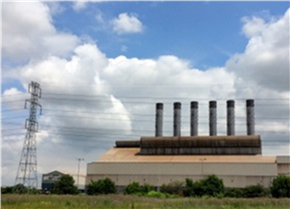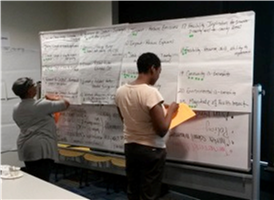Partnerships for Environmental Public Health (PEPH)
Study Location: Detroit, Michigan
Academic Partners:
University of Michigan
Amy Schulz, Ph.D.
Stuart Batterman, Ph.D.
Community Partners:
Detroiters Working for Environmental Justice
Detroit Hispanic Development Corporation
Southwest Detroit Environmental Vision
Project Description

The Community Action to Promote Healthy Environments project is identifying air pollutants in Detroit that are associated with health problems.
(Photo courtesy of Amy Schulz)
This project builds on more than 15 years of community-based participatory research to understand and address urban air pollution and its effects on health, an issue identified as a priority by Detroit community members. The partnership engages community, academic, and public health practice partners in research that will be used to develop and implement a public health action plan for reducing exposure to air pollutants, reducing adverse health effects, and providing additional health and environmental benefits to the local community. One strategy being studied is the use of green buffers to separate residential areas and schools from polluting sources such as highways. Overall, this academic-community partnership aims to improve the health and quality of life in communities disproportionately at risk for cardiovascular and respiratory diseases, which are linked with air pollution exposure.

Members of the Community Action to Promote Healthy Environments Steering Committee participate in a mitigation strategy prioritization exercise.
(Photo courtesy of Amy Schulz)
Specific project aims are to:
- Strengthen, support, and enhance the capacity of the community, academic, and practice partners to work effectively together and to conduct, understand, and communicate about the science of air pollution and human health.
- Identify air pollutants associated with health problems and examine strategies to prevent or lessen exposure.
- Collaboratively develop a multilevel and scientifically informed public health action plan to reduce exposure to air pollution and to reduce health problems stemming from exposure.
- Collaboratively develop and implement campaigns, interventions, and policies that promote the adoption and implementation of the public health action plan.
- Evaluate the development process and outcomes of the public health action plan. This includes assessing the effectiveness and impact of campaigns, interventions, and policies implemented as part of the plan and assessing factors that influenced the success of these actions.


